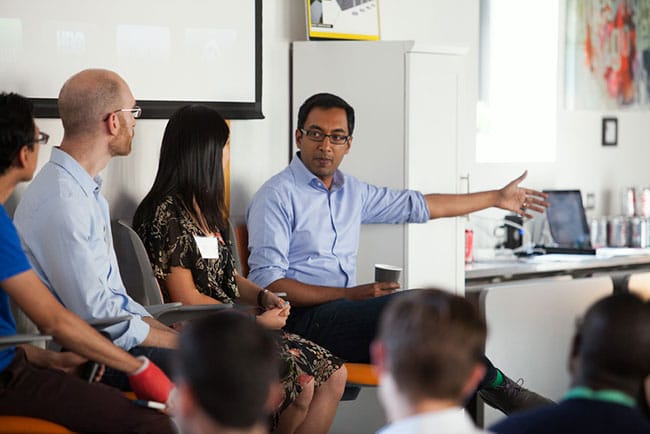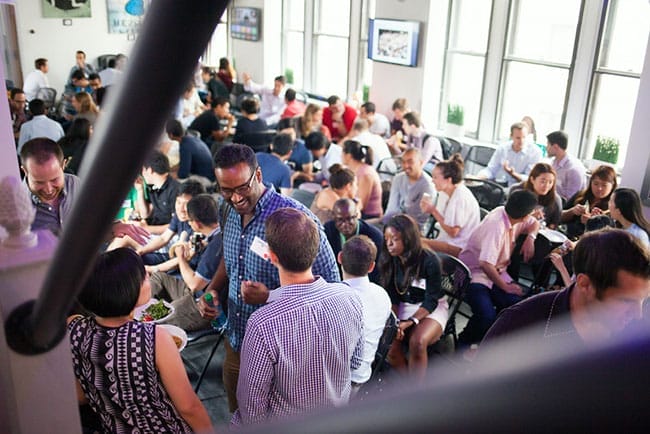This August, I worked with several classmates and administrators to put together the fourth annual Wharton Founders’ Retreat. Organized by Penn Founders’ Club and the Entrepreneurship Club, Founders’ Retreat has become an integral part of pre-term for those who plan to start a company at Wharton. It’s an early opportunity for first-year MBAs to network with other founders and to start integrating into Wharton’s startup ecosystem.
The event reinforced two things. First, entrepreneurship at Wharton is more than just a passing fad. Second, Wharton is the one of the best environments in the world in which to launch a company.
Here to Stay
Despite the well-known recent increase in entrepreneurship at Wharton, we underestimated just how much the interest continues to grow. We decided to hold the event at Benjamin’s Desk, a co-working space near Rittenhouse Square that had capacity for 75 students. Even though we invited only a small percentage of the class, the event sold out in just over an hour. This was unprecedented. This year’s attendees not only distinguished themselves with quantity, they also did it with quality. Second-time co-founders, VC-backed entrepreneurs, and veterans of Facebook and Google were all in the room.
There’s a chance that entrepreneurship could be a fad with today’s MBA students, but there are several reasons to take the other side in that debate.
- First, as Ethan Mollick, Wharton’s Edward B. and Shirley R. Shils Assistant Professor of Management, said during his opening keynote, the cost of getting a company off the ground has decreased by at least an order of magnitude since he started his company in the 1990s.
- Second, now that the Wharton startup ecosystem is so vibrant, churning out successful companies should become an easier task. When Brett Hurt, WG’99, co-founder of BazaarVoice (and Wharton Magazine blogger) came to speak on campus this spring, he mentioned how the community of entrepreneurs at Wharton during his time could be counted on two hands. That’s certainly not the case anymore. With recent successes like Commonbond, baby.com.br, Senvol and Warby Parker, students are more apt to feel that building a company at Wharton is imminently achievable.
- Third, Philadelphia has changed for the better. As one example, I moderated a funding panel that included three Wharton alumni (Ellen Weber, W’82, of Robin Hood Ventures; Brett Topche, W’03, of MentorTech Ventures; and Michael Kopelman, C’97, WG’05, of Edison Ventures). All are locally based and providing capital to companies at different phases in the funding lifecycle.

Michael Kopelman (foreground), Brett Topche (middle) and Ellen Weber (rear) speak at Wharton Founders’ Retreat. Photo credit: Kat Clark.
Strength of the Wharton Startup Community
Founders’ Retreat was structured to reinforce two things to the first year class – the strength of their classmates and the strength of the Wharton network spanning many classes. With 93,000 alumni, this is true in any field of business, but it’s an especially important point to reinforce to entrepreneurs.

Apu Gupta, Annie Wang, Davik Klein and Karthik Hosanagar (right to left). Photo credit: Kat Clark.
Having a support system of founders can be critical to a company’s success. As Apu Gupta, WG’05, co-founder of Curalate, mentioned in his talk at the Founders’ Retreat, when you have a problem with your company, you can’t go to your employees with it, and usually your spouse is sick of hearing about it. Entrepreneurship can be a lonely undertaking, but with a community of fellow founders it becomes much less so.
The beginning of the new school year is a great reminder to always be on the lookout for opportunities to convene founders in the same place and build an even deeper community. We’re looking forward to seeing the next batch of great companies being built right here at Wharton.
Other 2014 Wharton Founders’ Retreat student organizers included Founders’ Club organizers David Kimball and John Li and Entrepreneurship Club co-presidents Anjali Bhatia, Marie Fukuura and Tisha Vaidya. Speakers included Mollick, Xinmei Zhang and Yongge Dai Professor David Bell and Associate Professor Kartik Hosanagar, as well as entrepreneursDavid Klein; Davis Smith, G’11, WG’11; and Annie Wang, C’05, G’13, WG’13.


























